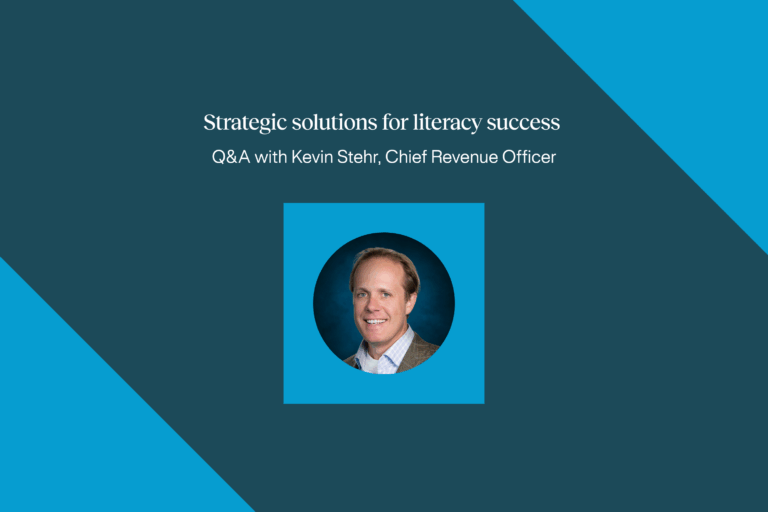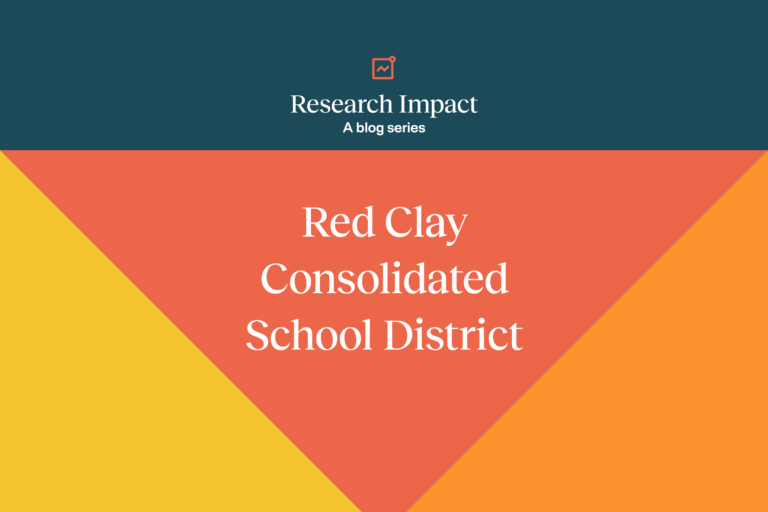Experts Corner: Erin Hamilton, Vice President, Educational Strategy
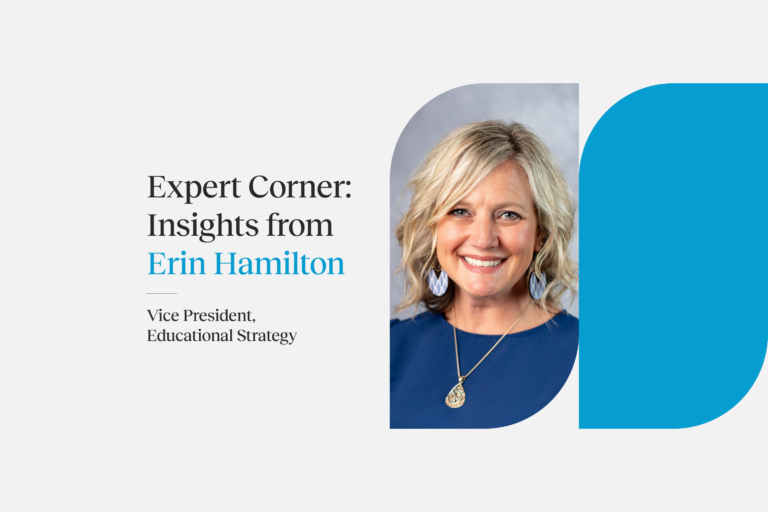
We recently sat down for a conversation with Erin Hamilton, EdD, Vice President, Educational Strategy at 95 Percent Group. Erin is passionate about what she calls, “literacy—the long game.” After 15 years in the classroom, she transitioned to literacy consultant and then to curriculum specialist in Pennsylvania where she got her doctorate in educational leadership to better support the leaders she advised. Read on to learn why Erin calls literacy “the long game.”
How would you finish this sentence? The power of reading is…
The power of reading is the gateway to opportunities. Without the ability to read, many other tasks become nearly impossible.
How did you first learn about the science of reading and structured literacy?
I spent 15 years as a K-5 classroom teacher, where I was trained in balanced literacy. At the time, that was the only approach I knew, and I followed it closely. Some of my students thrived, but I still remember the faces of those who didn’t. Back then, I simply didn’t know there was a better way.
Then I made a significant career transition to literacy consultant at an intermediate unit in Pennsylvania. That’s where I first learned a lot about the science of reading and structured literacy.
The Pennsylvania Intermediate Unit provided me with professional development in the science of reading, enabling me to understand how to transform literacy instruction. Many of the schools I supported still used a balanced literacy approach, so I had to get creative. I introduced best practices without labeling them as “science of reading” or “balanced literacy.” My goal was to demonstrate that these strategies would be effective if implemented, regardless of the terminology.
How is working with school leaders different from working with teachers and coaches?
When I transitioned from a literacy consultant to a curriculum specialist at the same unit, my audience shifted. Instead of working with teachers and coaches, I began collaborating with superintendents and curriculum coordinators to develop comprehensive plans for their districts. I quickly realized that this audience required a different dialogue and approach compared to what I was used to with teachers and coaches.
That’s when I decided to pursue my doctorate in educational leadership. I recognized that to effectively support these leaders, I needed a deeper understanding of leadership—particularly around funding, resource allocation, and the decision-making processes at that level. This pushed me to elevate my skills in order to be of better assistance, and it was a rewarding challenge.
This role took me beyond the literacy focus I was passionate about and into a more strategic, long-term planning process. It highlighted the importance of what I call, “literacy—the long game.” Instead of thinking only about the immediate year, I encourage leaders to adopt a long-term strategy, typically over three to five years. This approach involves continual reevaluation—identifying what worked, what didn’t, what changes are needed, and what new staff may be required. That comprehensive planning experience enabled me to bring a forward-thinking mindset into the literacy space with the leaders I now support.
Your dissertation focused on the self-efficacy of elementary principals in foundational literacy leadership. Can you talk about that?
My dissertation focused on understanding how elementary principals felt about their ability to observe classroom instruction and provide feedback that could improve student outcomes. I surveyed 72 principals across Pennsylvania and conducted 10 in-depth interviews to explore their challenges. The same issues kept emerging: difficulty getting into classrooms, balancing instructional leadership with managerial tasks, and lacking the instructional knowledge needed to offer meaningful feedback.
What drew you to 95 Percent Group?
What attracted me to 95 Percent Group is the way we’ve developed curriculum and professional learning that are truly aligned. While our professional learning is product agnostic—you don’t need to use a specific product from us—the curriculum and professional learning work together seamlessly. I’m also inspired by our vision statement, which focuses on empowering educators with the tools and knowledge they need to excel in and enjoy delivering effective literacy instruction. We provide not just resources or expertise, but both, to support leaders nationwide.
What are you most excited about?
I’m most excited about the legislative momentum we’ve witnessed across the country over the past three to five years regarding the science of reading. These legislative changes have paved the way for some truly impactful implementations.
In our ebook, Science of Reading 2.0: Implementation Made Easy, Laura Stewart writes about letting an initiative happen, or making it happen.
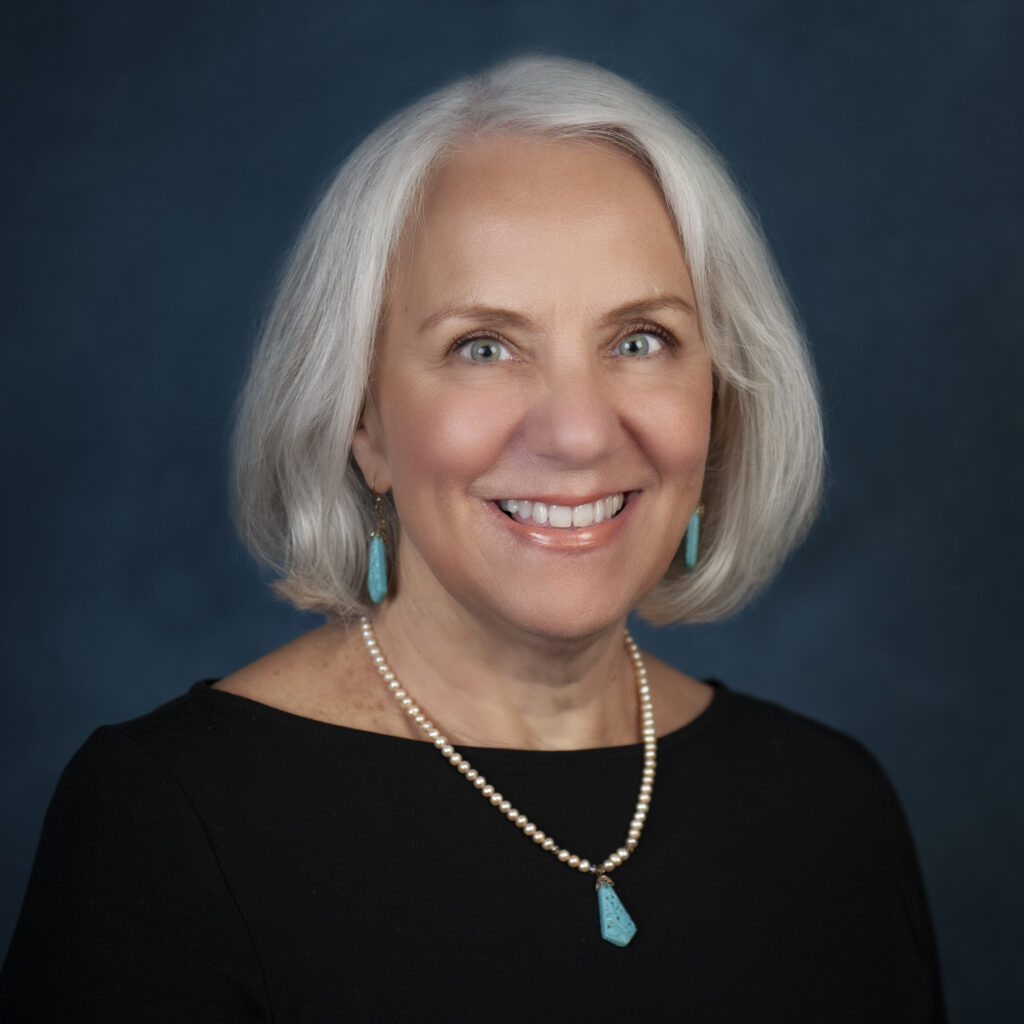
According to the Active Implementation Hub at the National Implementation Research Network, when a change is ‘let to happen’ there will be a 14% success rate in 17 years. But when a change is ‘made to happen’ there will be an 80% change in 3 years. With growing needs and limited budgets, we cannot afford to do anything other than ‘make it happen.’”
Laura Stewart
What excites me most this school year is the opportunity to engage in meaningful conversations with legislators, governors, and school leaders across the country about how they can actively drive change rather than passively “letting it happen.” It’s about shifting to a mindset of intentional implementation—planning a three- to five-year journey and fully committing to it. I’m especially excited to see leaders working closely with their State Departments of Education and being directly involved in making these initiatives a reality on a national scale.
What are the key pain points you’re hearing from leaders at the state level?
In my discussions with commissioners and state superintendents across the country, a major pain point is unfunded mandates. I often hear things like, “Our legislation provides clear requirements, but there’s no funding to support these new initiatives.” Districts are left to figure out how to finance these mandated changes, which presents a significant challenge.
Another issue I hear frequently is the struggle to become critical consumers in the literacy space, especially for decision-makers who may not have a strong background in literacy. They’re overwhelmed by the abundance of curriculum options, and it’s difficult to discern what’s truly effective. With the growing momentum around the science of reading, many publishers have started claiming their materials align with it, which adds to the confusion.
As advocates of the science of reading, I believe we have a responsibility to help leaders become more critical consumers. Educating them on how to navigate these choices is a major need I’m seeing nationwide.
What is your vision for building successful statewide partnerships?
That’s a great question. One challenge we face at 95 Percent Group is when decision-makers or leaders receive our communication, they often categorize us as vendors instead of viewing us as thought partners. To shift this perception, I’m working to build relationships with state organizations like the Association of Education Service Agencies. These organizations, which have different names across states, bring together executive directors and their teams at regional centers to discuss funding and support, making them ideal platforms for thought leadership.
Partnering with such organizations allows us to showcase our expertise in literacy advocacy nationwide. We have incredible experts like Laura Stewart, Antonio Fierro, and Mary Dahlgren, who can offer specialized knowledge in these areas. In short, these partnerships provide a valuable opportunity for us to be seen as thought partners rather than just vendors or publishers.
What do you think is the ideal experience for the student?
The ideal experience for a student is, first and foremost, feeling safe and happy at school. That has to be there before anything else can happen. And so, “Maslow before Bloom” is the quote that I’ve heard. We really have to remember that. And even with 95 Percent Group’s mission—unlocking the power of literacy for every child—it’s still Maslow before Bloom.
Once that is established, I think the ideal experience for every student is that teachers can understand where the student is in their ability, both in their successes and their challenges, and pull tools from their tool box to match that student’s need. I remember years ago, when I was in the classroom, I joked and said, “At one point we’re going to have an IEP for every kid.” And people kind of laughed. But the reality is, that’s great instruction. We don’t necessarily have to have a formal legal document of it, but as educators, we should have a plan of our instruction for every kid that’s in our classroom in front of us.
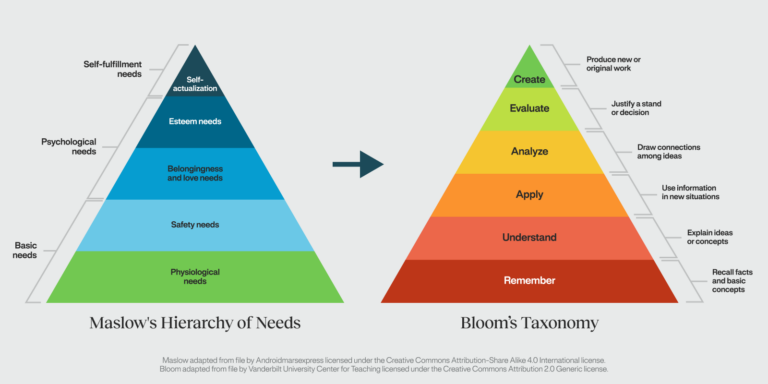
What is the ideal experience for teachers?
Teachers need to have a wide range of resources at their disposal, along with the expertise to know when and how to use each one. It’s important to maintain their professional autonomy, allowing them to make informed judgment calls—that’s why they’re in the classroom. However, there should be a balance. While flexibility is important, it must be within the framework of evidence-based, research-supported resources. Teachers need both the knowledge to select the right tool and the flexibility to apply it appropriately, ensuring that their decisions are grounded in solid instructional practices.
What’s the ideal experience for a school leader focused on literacy instruction?
Start with bite-size pieces and baby steps. It’s essential for a leader to have some major self reflection on the gaps that they have in their knowledge as a literacy leader. Then I would say find a mentor who is a little ahead in their journey to act as a guide on best resources—podcasts, reports, articles—because what I think really great literacy leaders can do is digest information that is given in multiple ways and then turn it around as options to grow their staff as well.
What is your favorite podcast?
Sold a Story has changed so many lives. I encourage everyone to listen to it. A podcast I listen to regularly with a legislative focus is ExcelinEd in Action State House Spotlights. It’s a great way for people across the country that are in that legislative space to hear and understand what others across the country are doing and get updates. It’s an easy listen.
Is there anything you’d like to add?
Regardless of your role in education—whether you’re a policymaker, governor, commissioner of education, state superintendent, teacher, or paraprofessional—everyone has a full plate of priorities. But I have to emphasize that literacy must be moved to the top of that list. If we don’t prioritize literacy, many of the other priorities we’re focused on will inevitably fall short. Literacy needs to be at the forefront. Our students deserve it, our communities deserve it, and with the knowledge we have now, we owe it to them to do better. We know better now. We have to be doing better.
And just falling into what’s easy and practices that we’ve done forever, because it makes our job easy, or it makes our community spin the way it always has, I think that we’re doing a disservice to our kids and our families across the country. Our national scores are scary, and although some of our State report cards have come out recently to show that there’s improvements, the improvements are still so small, so there’s still a lot of work to do and we have to continue to keep literacy at the top of that priority list.
One last important question: How do you address school leaders who feel caught in a funding dilemma?
I believe the “ESSER cliff” is a very real challenge. The media has coined the term, and it resonates with many of us. But before COVID-19, we had funding pathways that didn’t rely on government stimulus money. We found solutions through grants or Title funds, and I think it’s important to remind ourselves of those pre-pandemic strategies. We need to get creative again, rallying our teams and asking, “How did we secure those funds before? What opportunities are available now?”
Many states are doing a better job of offering grant opportunities, which is where the focus will need to shift. We’ve become accustomed to ESSER funds, and while they’ve been incredibly helpful, we always knew they were temporary. Now that we’re at that turning point, it’s critical to address this head-on. If literacy is going to remain our top priority, finding sustainable financial solutions must be a top priority as well.
Listen
Dr. Erin Hamilton was a guest on a KEDC Podcast—Partners in Education Episode—recorded in August, 2024. In the podcast, she discusses the importance of effective literacy instruction and the goal of achieving 95% or more proficient readers across the country. She shares her own journey as an educator and the need for continuous learning and growth. You can listen here.
Learn more
Are you interested in learning about how you can bring an effective and efficient structured literacy approach, grounded in the science of reading, to your school or district? Contact us today.
About Erin Hamilton
With a career spanning more than two decades, Erin Hamilton’s diverse journey progressed from 15 years as a K-5 educator to a literacy consultant, enhancing classroom practices with teachers in Pennsylvania. She then advanced to the role of curriculum specialist, collaborating with district superintendents on comprehensive planning and school improvement initiatives. During the past two years, Hamilton has extended her impact across the country, supporting state-level initiatives that accelerate the adoption of policies and legislation that emphasize evidence-aligned literacy instruction. She earned her doctorate in educational leadership from Immaculata University. Hamilton previously held the position of state solutions manager at Lexia®.
